Modelled approaches to activity traces collection, and associated querying, mining, visualization tools for traces data analysis.
-
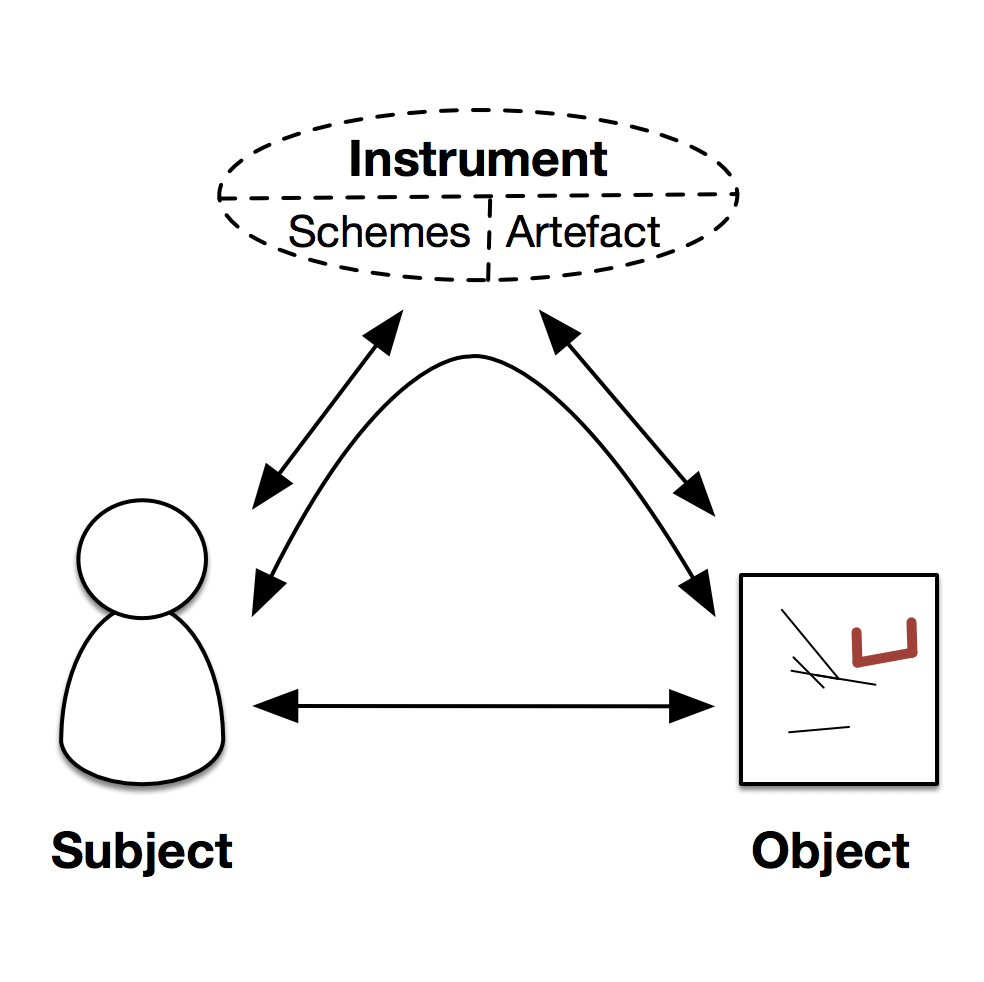
DIADEME: Digital Instrument and Activity DEvelopMEnt
Digital Instruments
Experience analysis and modelling
Interpretation Systems
Trace-based Activity Analysis
A small research program around the notion of Digital Instrument, and their co-evolution with humans, mainly related to Amaury Belin PhD thesis, as well as HdR writing. May be reactivated.
Details
Partners: LS2N
Funding: Amaury Belin PhD funding, Atlanstic 2020
Beginning: 2012-10-01
End:
Related publications
-
Amaury Belin, Yannick Prié, Aurélien Tabard. (2014) Supporting the Development of Digital Skills in Digital Intelligence, Nantes, France, sept 2014. Show abstract In a world where activities, goals and available software are rapidly changing, users must constantly adapt. In this position paper, we discuss how digital skills are different from traditional skills due to their highly dynamic na-ture, both in the tools used and the tasks to be carried out. We advocate the needs both for interdisciplinary theory to conceptualize digital skill develop-ment, and for longitudinal, large-scale and trace-based methods to observe such phenomenon. We illustrate how digital tools could better support users in the development of skills, highlighting how traces of interaction could be leveraged within reflective and skill-sharing tools.
-
Amaury Belin, Antipov Grigory, Julien Blanchard, Fabrice Guillet, Yannick Prié. (2014) Mining Users Skills Development From Interaction Traces: an exploratory study in Atelier Fouille visuelle de données temporelles, IHM 2013, Nov 2014, Bordeaux, France. 2p, 2014 Show abstract In this paper, we report an exploratory work related to the detection of user skills development from large interactions traces. We present a statistical approach to tackle the development of user's low level skills by identifying patterns of action and studying their progressive automations (i.e. as a user develops skills, they execute common subsequent actions faster) as well as their evolutions (i.e. user elaborating innovative ways to achieve a common task).
-
Amaury Belin, Yannick Prié. (2012) Towards a model for describing appropriation processes through the evolution of digital artifacts in Designing Interactive Systems DIS2012, pp. 645-654, Newcastle, June 2012. [AR:20%] doi Show abstract Appropriation of technology is a process by which users complete the work of designers by making interactive systems functional within the frame of their situated activities. While existing theories and studies about appropriation are oriented toward the psychological or organizational dimension of this process, we propose a model to describe it through evolutions of digital artifacts and information structures. We also present a case study demonstrating how this model helps to identify particular user operations, and related digital transformations, as a part of the appropriation process. These findings open perspectives to bridge scattered theoretical approaches of appropriation around a low-level, artifact-oriented, and objective way of describing appropriation. Our model could also improve the way appropriation is taken into account in design, by bringing more focus on technical aspects of interactive systems.
-
Yannick Prié. (2011) Vers une phénoménologie des inscriptions numériques. Dynamique de l’activité et des structures informationnelles dans les systèmes d’interprétation in Habilitation à Diriger des Recherches en Informatique, Université Claude Bernard Lyon 1, Nov 2011, 247 p. (Soutenue le 18 novembre 2011 à l'Université Claude Bernard Lyon 1 - Laboratoire LIRIS - UMR 5205 CNRS - École Doctorale Informatique et Information pour la Société) This study is mandatory to get a Professor position in France. The document is entitled Towards a Phenomenology of Digital Inscriptions. Dynamics of Activity and Informational Structures in Interpretation Systems. In the first chapter I first study the notion of inscription of knowledge as proposed by Bruno Bachimont. As I consider it is not sufficiently tied with human action and activity as considered by post-cognitivist theories, I propose to consider the notion of informational structures (structures informationnelles). Informational structures are digital inscriptions of knowledge that are actually manipulated by subjects during their computer-mediated activity, they can be canonical (explicitely manipulated by the system) or non canonical (but as such, they can become canonical if reified). The notion of informational structure is useful to study how digital inscriptions and activity are interwoven at different analysis levels, it is associated to the notion of information space that users enact during their activities, and enables to study at the individual level what could be called a phenomenology of digital inscriptions. In the second chapter of the document, I focus on explicit information spaces that users enact during knowledge work, and detail the notions of interpretation systems within which inscriptions of knowledge circulate. I present my work on video active reading and the Advene project. In the third chapter, I propose to define traces as inscriptions that are used during an activity as signs of the past, and I discuss the notion of interpretation systems that are dedicated to traces. I present my work on such systems, along first the Musette (Modelling Users and Tasks to Traces Experience) approach and then the mTBS (Modelled Trace-Based systems) approach.
Examination committee: Nathalie Aussenac (Directeur de Recherche, CNRS, Toulouse; referee), Bruno Bachimont (Enseignant-Chercheur HDR, UT Compiè̀gne; referee), Sylvie Leleu-Merviel (Professeur, Université de Valenciennes; referee), Michel Beaudouin-Lafon (Professeur, Université Paris-Sud; examiner), Catherine Garbay (Directeur de Recherche, CNRS, Grenoble; examiner), Alain Mille (Professeur, Université Lyon 1; examiner), Pascal Salembier (Professeur, UT Troyes; examiner). Show abstract Ce mémoire est l'occasion de présenter nos travaux à l'Université Claude Bernard Lyon 1. Il est composé de trois parties, la première visant à proposer une thématisation originale des liens entre activité et inscriptions numériques de l'activité sous la forme de structures informationnelles, les deux suivantes étant consacrées à nos thématiques principales de recherche qui sont, d'une part la lecture active audiovisuelle et les systèmes d'interprétation, et d'autre part les systèmes à base de traces modélisées.
Le premier chapitre est consacré à l'exploration des liens entre l'activité informatiquement médiée et les représentations qui y sont impliquées. Une première étude critique décrit la notion d'inscription de connaissances proposée par B. Bachimont au sein d'une théorie du support pour permettre de penser la rencontre ou l’expérience qu’une conscience fait des dispositifs technologiques et des inscriptions. Cette proposition vise à thématiser la numéricité des inscriptions et nous intéresse donc à ce titre, mais elle se révèle à notre sens insuffisante pour penser un individu actif engagé dans un processus de manipulation d'inscriptions. Une seconde étude est alors consacrée aux liens entre action, activité et inscriptions dans les théories dites « post-cognitivistes » de la cognition. Les inscriptions soutiennent l'activité et la sous-tendent tout à la fois, et nous nous intéresserons particulièrement aux inscriptions dans leur perception et leur manipulation par un être humain suivant la théorie instrumentale. Cependant, les inscriptions en tant qu'elles peuvent être numériques ne sont que peu thématisées. Notre dernière étude est orientée autour de la proposition de penser la notion de structure informationnelle et les instruments associés comme permettant d'articuler le monde numérique à l'activité humaine et l'activité humaine au monde numérique. Une structure informationnelle est une inscription numérique en acte, objectivable, mais non obligatoirement canonique, c'est-à-dire manipulée explicitement par le système. Cette proposition permet de penser le côté humain de l'activité instrumentée tout en conservant le calcul et les représentations associées comme préoccupation informatique. Nous présentons également la notion d'espace informationnel qu'un utilisateur énacte, et les directions de recherche ouvertes par nos propositions.
Le deuxième chapitre est principalement consacré à la présentation de nos travaux sur les systèmes de lecture active audiovisuelle. Nous proposons d'abord une étude rapide sur le cadre général des technologies intellectuelles comme soutenant le travail intellectuel, l'activité ouverte d'interprétation et de manipulation d'inscriptions de connaissances personnelles. De telles inscriptions et réinscriptions se font au sein de ce que nous proposons d'appeler des systèmes d'interprétation qui offrent aux utilisateurs la possibilité de manipuler consciemment des structures informationnelles de toutes sortes, par exemple sous la forme de données, de schémas ou de feuilles de style et de formulaires, et de partager celles-ci comme réifications de pratiques. La lecture active audiovisuelle est une activité intellectuelle qui s'effectue dans un système d'interprétation permettant de construire des hypervidéos à partir d'annotations. Nous présentons alors nos travaux autour du projet Advene (Annotate Digital Video, Exchange on the NEt), notamment les modèles associés, l'outil générique Advene pour l'annotation et la construction d'hypervidéos, ainsi que quelques applications de lecture active associées à l'analyse des interactions et la critique filmique. Nous pouvons alors tirer un bilan des presque dix ans de ce projet et proposer quelques directions pour la suite.
Le troisième et dernier chapitre présente essentiellement nos travaux sur les traces numériques. Nous définissons d'abord la notion de trace en général comme inscription permettant de viser le passé au cours d'une interprétation et présentons comment les traces d'activité médiées sont largement utilisées au sein de systèmes variés allant de l'analyse à la réflexivité. Nous considérons que l'enjeu est de manipuler des traces numérique explicites définies comme « inscriptions canoniques temporellement orientées » dans des systèmes d'interprétation orientés trace. Nous pouvons alors présenter la notion de trace modélisée comme un certain type de trace explicite, ainsi que nos travaux dans ce cadre depuis plus de dix ans : l'approche Musette, le cadre général des systèmes de base de traces modélisées (SBTm) ainsi que la formalisation des traces et des transformations pour construire des systèmes de gestion de bases de traces (SGBT). Différents travaux applicatifs sont ensuite présentés qui permettent d'illustrer les différentes utilisations des traces modélisées dans des contextes applicatifs variés, visant notamment le support à l'awareness, à la remémoration, à la réflexivité, à la redocumentation et au partage, ou encore à la reprise d'activité.
Related software
-
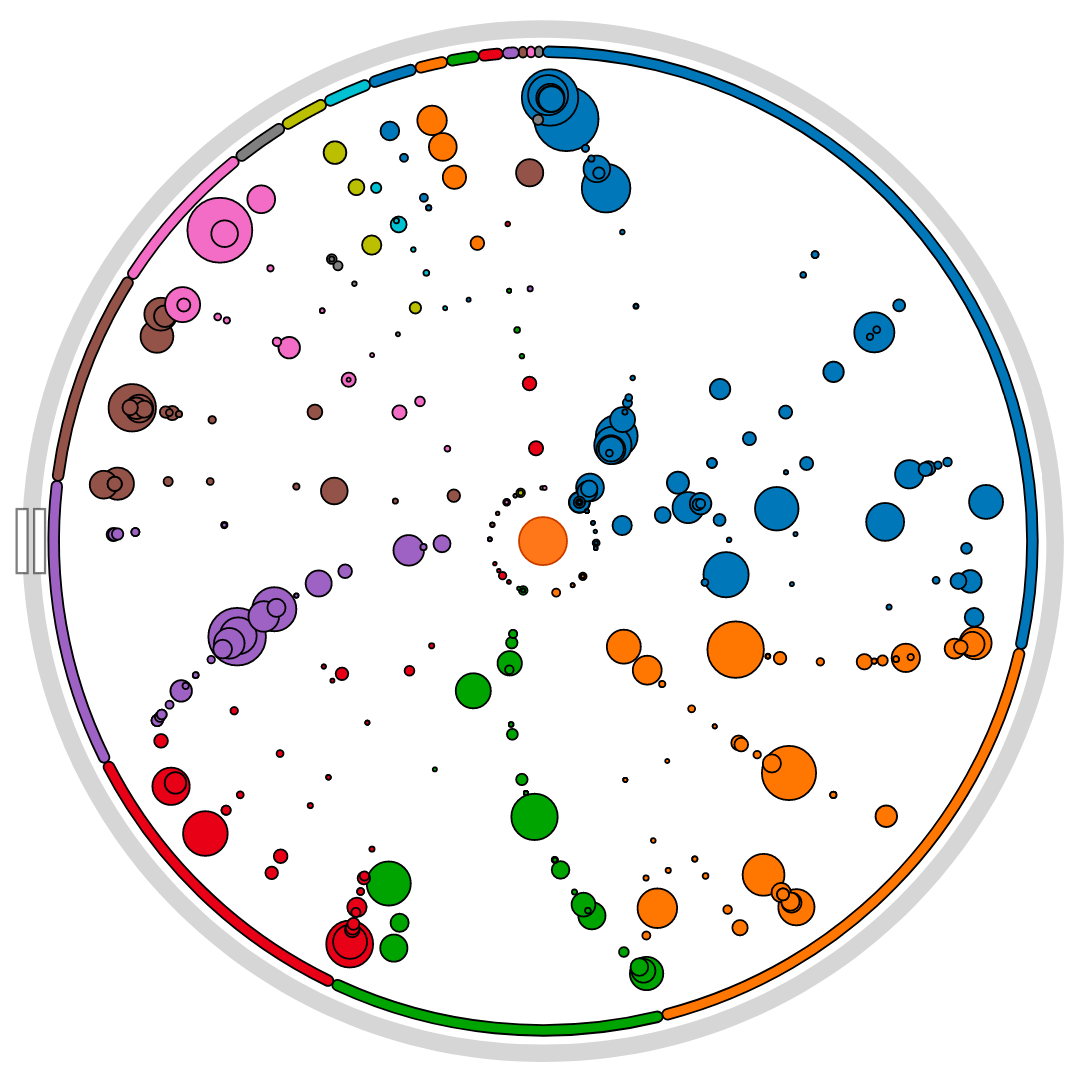
EPISTEME: Transdisciplinary epistemology of digital technologies
Data Visualization
Digital Instruments
Interpretation Systems
Reflective Systems
Trace-based Activity Analysis
Work on data analysis of astrophysical research activity, producing datavisualizations that highligh different processes related to observations, the organization of working groups, as well as the software "black boxes".
Details
Partners: IRI Centre Pompidou, LINA, LIRIS, CHS Paris 1, CEA Irfu, France Televisions, Mediapart
Funding: French National Research Agency (ANR)
Beginning: 2014-10-01
End: 2018-02-28
Website: https://projet-episteme.org/
Additional comments
The aim of this transdisciplinary program EPISTEME is first to identify the most characteristic aspects of the transformation of two chosen disciplines (astrophysics, history) in their relations to their objects under the effect of digital formalization. The other goal is to design instruments for the scientific communities of peers that allow contributive categorization, to support debates and controversies, based on the concept of transindividuation, and to articulate bottom-up -stemming from individual research activities- and top down processes -more or less local, laboratory-, school- or discipline-wide certification processes from peer community debates.
We developed the Herschel Mission Explorer. We are currently working on a second version that will feature a general design overhaul.
Additional illustrations
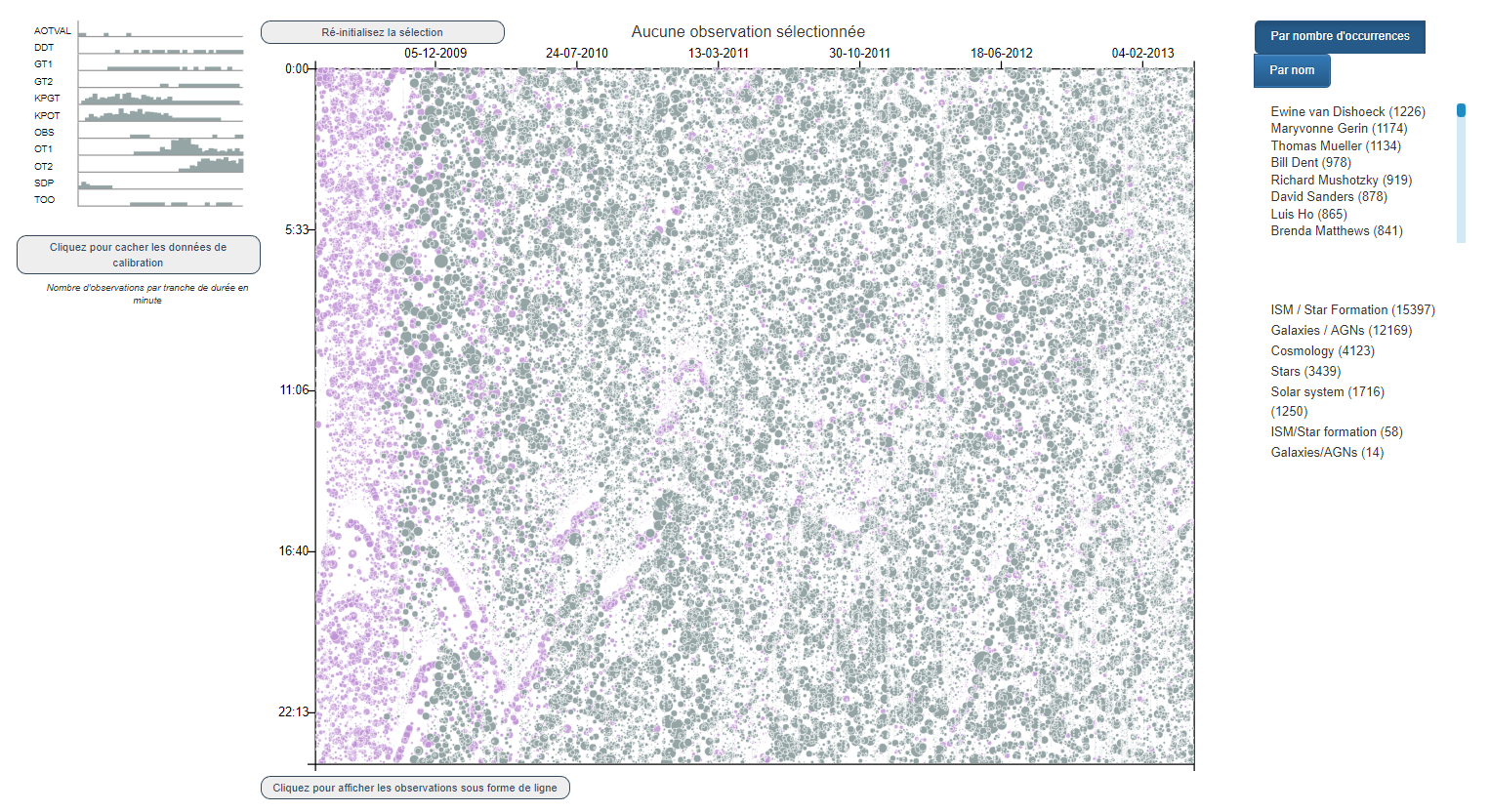
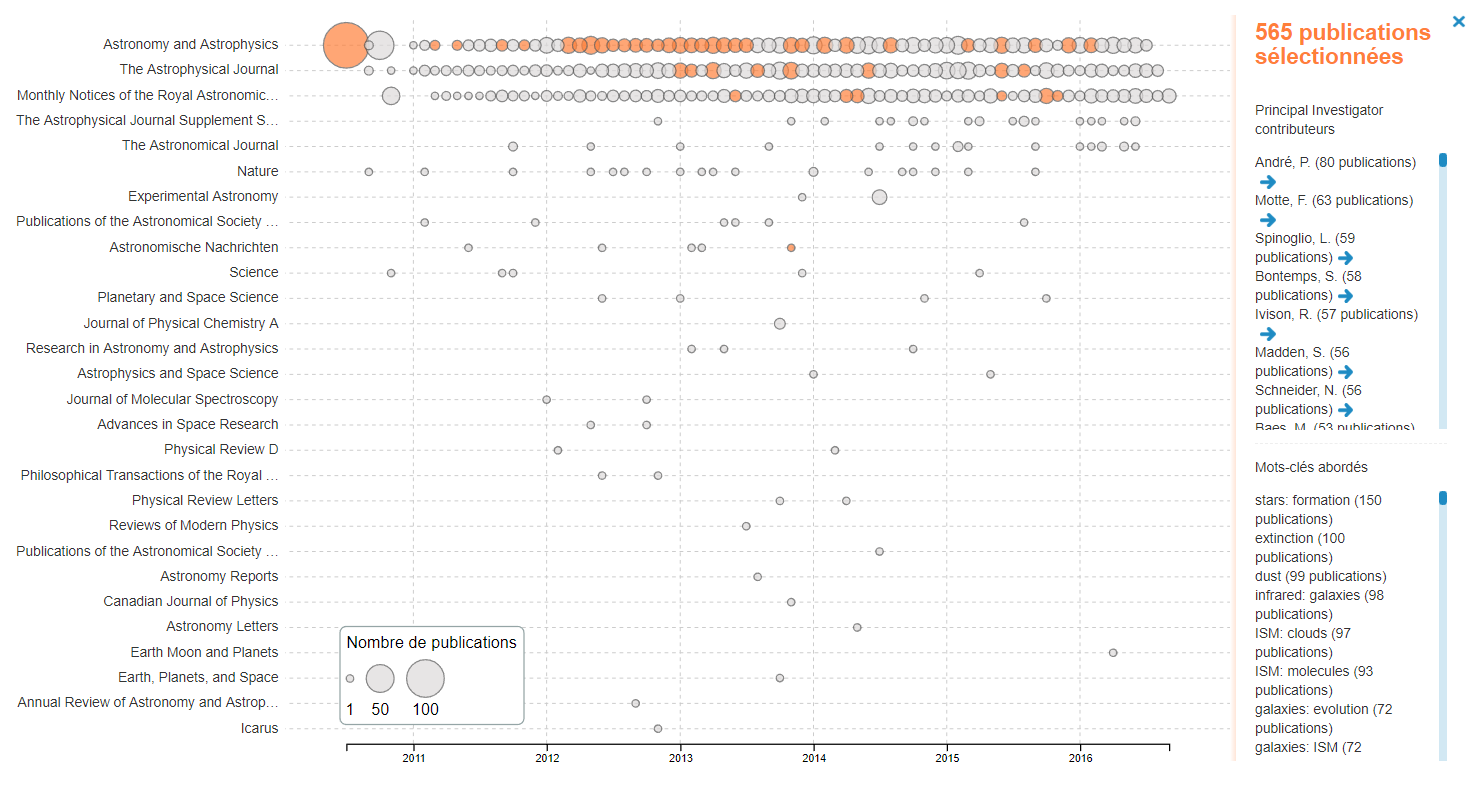
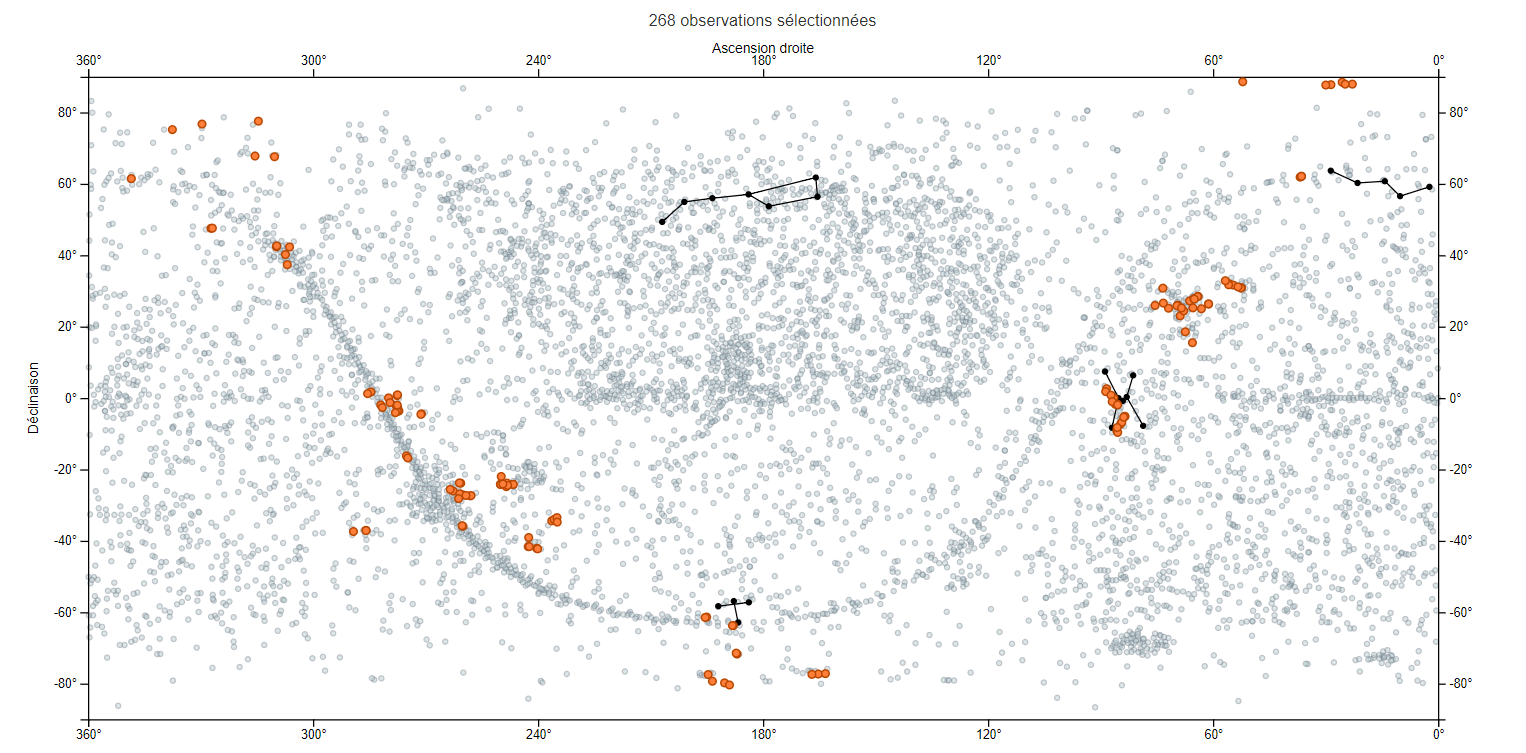
-
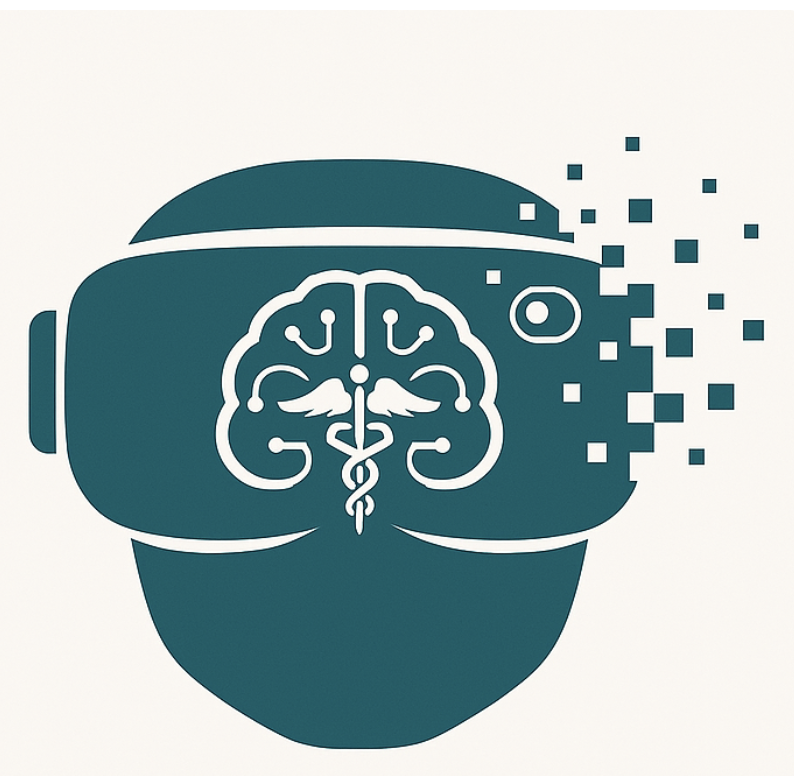
IPC4MH: Immersive Prevention Centers for Mental Health
Patient Experience
Trace-based Activity Analysis
VR and Psychotherapy
Virtual Reality
Designing and evaluating immersive prevention centers for junior and senior patients in the case of mental health secondary and tertiary prevention.
Details
Partners: HES SO, Nantes University, Polish Academy of Sciences, CHU Nantes, Diverssity, C2Care
Funding: THCS 2024 (Transforming Health and Care Systems)
Cofunding:
Beginning: 2025-04-01
End: 2028-08-31
-
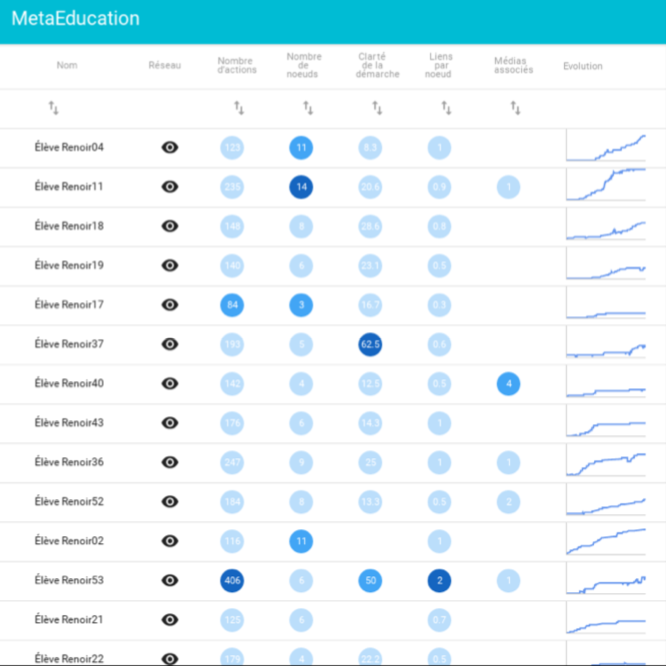
Meta-éducation
Learning Analytics
Trace-based Activity Analysis
A project hosted in Lyon at LIRIS on traces and learning environments. We worked on conceptual graph building activity, designing dashboard for teachers to appreciate students behavioral and cognitive engagement.
Details
Partners: LIRIS, ERDENET, IRI Centre Pompidou, ITOP
Funding: Investissement d'avenir - E-éducation
Beginning: 2014-02-01
End: 2017-12-31
Related publications
-
Rubiela Carrillo, Yannick Prié, Leslie Guillaume, Elise Lavoué. (2018) Suivre l’engagement des apprenants dans l’activité de construction de cartes mentales in Sciences et Technologies de l’Information et de la Communication pour l’Éducation et la Formation (STICEF). 25(1). Show abstract Notre travail a pour objectif d’aider les enseignants à suivre l’engagement de leurs apprenants pendant des activités de construction de cartes mentales. Les cartes mentales sont utilisées pour aider les apprenants à organiser les contenus étudiés en classe. Étant donnée la complexité des cartes, les enseignants ont besoin d’outils qui assistent la compréhension des cartes produites et de leur processus de construction. Nous avons défini avec des enseignants un ensemble d’indicateurs d’engagement, reposant sur les traces d’interaction des apprenants. Ces indicateurs ont été implémentés dans un tableau de bord à destination des enseignants. Cet article présente la première version du tableau de bord implémenté, sa conception, son implémentation, et les résultats d’une évaluation sur les aspects d’utilisabilité et utilité.
-
Rubiela Carrillo, Clément Renaud, Yannick Prié, Élise Lavoué. (2017) Dashboard for monitoring student engagement in mind mapping activities in IEEE 17th International Conference on Advanced Learning Technologies (ICALT), Jul 2017, pp. 433-437, Timisoara, Romania. doi Show abstract Our work aims at helping teachers to monitor learners' engagement during mind mapping activities. The use of mind maps helps students to elaborate cognitive learning strategies like creating and organizing contents. To assess the quality of these mind maps, teachers need tools to understand students' choices and strategies when constructing their mind maps. We have defined in collaboration with teachers a set of indicators based on learners' interaction traces. Those indicators have been implemented and integrated in a dashboard dedicated to teachers. In this paper, we introduce a first version of the dashboard: its design, implementation, and the results of its evaluation conducted during interviews with real teachers.
-
Rubiela Carrillo Rozo, Clément Renaud, Yannick Prié and Elise Lavoué. (2017) Tableau de bord pour le suivi de l'engagement des apprenants lors de la construction de cartes mentales in 8ème Conférence sur les Environnements Informatiques pour l'Apprentissage Humain (EIAH 2017), Jun 2017, Strasbourg, France. pp.113-124, 2017. Show abstract Les cartes mentales permettent aux apprenants de mettre en place des stratégies cognitives d'apprentissage telles que l'élaboration et l'organisation des contenus étudiés en classe. Étant donné leur complexité, les enseignants ont besoin d'outils pour les aider à comprendre les cartes mentales produites et leurs processus de construction. Notre objectif est de permettre aux enseignants de suivre l'engagement des apprenants lors de ce type d'activité. Nous avons défini avec des enseignants des indicateurs basés sur les traces d'interaction des élèves permettant de suivre et d'expliquer les modalités et les choix de construction des cartes mentales. Ces indicateurs ont été implémentés dans un tableau de bord à l'usage des enseignants, que nous avons commencé à évaluer au cours d'une série d'entretiens. Nous présentons dans ce papier le prototype du tableau de bord ainsi que les premiers résultats de cette évaluation.
-
Rubiela Carrillo, Élise Lavoué, Yannick Prié. (2016) Towards Qualitative Insights for Visualizing Student Engagement in Web-based Learning Environments in Proceedings of the 25th International Conference Companion on World Wide Web, pp. 893-898 Show abstract Learning Sciences argue that student engagement is composed of behavioral, motivational and cognitive dimensions. Many proposals in Learning Analytics have provided teachers with quantitative indicators focusing only on students' behaviors, such as the number and the duration of their actions with the learning environment. In this paper, we propose visual representations of cognitive indicators to add explanatory elements to behavioral indicators. We describe our general architecture for collecting and aggregating data used to build the proposed visualizations. We illustrate the use of these indicators in various pedagogical scenarios oriented towards supporting teachers in students' actions and performances understanding.
Additional comments
PhD thesis of Rubiela Carillo
-
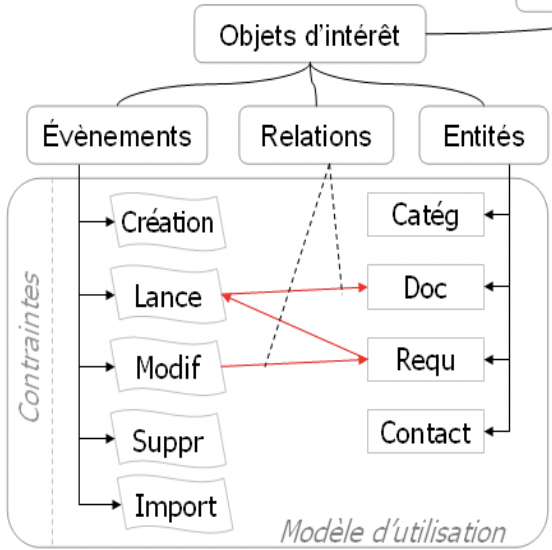
Musette: Modelling USEs and Tasks for Tracing Experience
Knowledge Engineering
Trace-based Activity Analysis
Trace-based Systems
A first tentative towards modelling information systems use experience as traces, going from Case-Based reasoning to Trace-based reasoning, with a modelled approach to traces, and episodes querying to foster user assistance and activity analysis.
Details
Partners: false
Funding: various
Beginning: 2000-10-01
End: 2005-12-31
Related publications
-
Julien Laflaquière, Yannick Prié. (2009) Musette : Modéliser les Usages et les Tâches pour Tracer l'Expérience in Réutilisation de l'expérience : modèles et applications, Hermès, 2009. Show abstract L’objectif général de ce chapitre est de présenter l’approche Musette – Modéliser les USages et les Tâches pour Tracer l’Expérience – développée au LIRIS depuis plusieurs années.
-
Pierre-Antoine Champin, Yannick Prié and Alain Mille. (2004) MUSETTE: a Framework for Knowledge Capture from Experience in short paper in EGC'04, Clermont Ferrand, jan. 2004 Show abstract Nous présentons dans cet article une nouvelle approche de modélisation de l'expérience d'utilisation d'un système informatique, avec pour objectif de réutiliser cette expérience en contexte pour assister l'utilisateur à effectuer sa tâche. Le modèle se base sur la capture d'une trace d'utilisation conforme à un modèle d'utilisation général, lequel décrit les objets et les relations manipulés par l'utilisateur du système informatique visé. Cette trace primitive peut être considérée comme une base de connaissances neutre par rapport à la tâche, qui peut être analysée a posteriori à l'aide de signatures de tâche expliquées permettant d'y localiser des épisodes signifiants qui pourront être réutilisés par des assistants logiciels comme connaissances contextualisées. Quatre scénarios illustrent cette approche. (paper in english)
-
Julien Laflaquière, Yannick Prié. (2003) Modélisation d'utilisation de système pour une assistance à base de trace : une application de MUSETTE à la tâche de veille documentaire in Workshop Traces, interactions, co-constructions collectives et relations à la cognition. AS CoMETE, Paris, 19 déc. 2003. Show abstract La complexification des activités de haut niveau s'appuyant sur des outils informatiques et la généricité grandissante de ces mêmes outils, posent la question de la (re)définition de la place et du rôle de l'assistance relativement à ces activités et à ces outils. Cet article présente une approche de modélisation d'utilisation (MUSETTE), destinée à la création d'une assistance basée sur la réutilisation d'expérience, ainsi que sa mise en ½uvre dans le domaine particulier de la veille. Ce travail a débuté lors d'un stage de DEA au LIRIS. La réutilisation d'expérience dans une assistance visant spécifiquement une activité de haut niveau est une réponse possible, au problème de (re)définition de l'assistance, se démarquant d'approches plus « classiques ». L'approche globale MUSETTE et trois étapes clefs de modélisation sont développées, les perspectives offertes par ce travail sont discutées.
-
Pierre-Antoine Champin and Yannick Prié. (2003) Musette: uses-based annotation for the Semantic Web in Annotation for the Semantic Web, S. Handschuh (ed.), IOS Press, Amsterdam, pp. 180-190, 2003. Show abstract In Tim Berners-Lee’s vision of the Semantic Web, software agents must be able to retrieve knowledge relevant to the end-user’s task, despite the heterogeneity and scale issues which are inherent to the web. Annotating web resources is considered a promising way to achieve this vision. We argue in this chapter that every actual use of a resource may provide useful knowledge about that resource and therefore should annotate it. We propose a framework for taking uses into account and annotating resources with their uses. This framework is the result of a generalization effort in our team after a number of projects focusing on modeling uses and experience. We believe that this framework is relevant to the Semantic Web where uses-based annotation may prove valuable.
-
Elöd Egyed-Zsigmond, Alain Mille, Yannick Prié́. (2003) Club (Trèfle) : a use trace model in 5th International Conference on Case-Based Reasoning, LNCS, volume 2689, Trondheim, NO, pp. 146–160. [AR:21%] doi Show abstract In this paper we present a use trace model which allows the collection and reuse of user experience, based on a homogeneous and interconnected representation of users, procedures and objects. All these notions form a connected labeled directed graph containing highly connected and explained use traces. This model enables assistance in non trivial, creativity requiring situations. Our model uses the Case Based Reasoning (CBR) paradigm in order to reuse experience. After a formal description of the model we discuss how it can serve to capitalize and re-use experience.
-
Pierre-Antoine Champin, Yannick Prié. (2002) Modéliser l'utilisateur ou l'utilisation ? in Document Virtuel Personnalisable 2002, Brest, july 2002, pp. 97-102. Show abstract Les modèles d’utilisation nous semblent au moins aussi légitimes que les modèles d’utilisateurs pour piloter la personnalisation. En effet, personnaliser un document virtuel revient à influer sur ses modes d’utilisation pour faciliter la tâche de l’utilisateur, et donc nécessite de modéliser son utilisation. Or d’une part, il n’existe pas de relation bi-univoque entre utilisation et utilisateur : le même utilisateur a souvent plusieurs tâches à effectuer, pour lesquelles ses préférences peuvent varier grandement ; inversement, des utilisateurs effectuant les mêmes tâches devraient pouvoir partager des traits de personnalisation — dans le contexte de cette tâche. D’autre part, modéliser l’utilisation à partir d’un modèle de l’utilisateur implique un changement d’objet de modélisation (utilisation/utilisateur), et donc l’utilisation de méta-connaissances, souvent introduites a priori, sur les correspondances entre ces modèles, et dont l’acuité conditionne la pertinence de la personnalisation proposée. À l’inverse, personnaliser à partir d’un modèle d’utilisation évite d’avoir à changer d’objet de modélisation. Nous développons l’idée que les traces d’utilisation devraient être prises en compte pour la personnalisation de documents virtuels, et nous en proposons un modèle issu de nos travaux récents. Nous donnons également quelques exemples de réutilisation des usages pour la personnalisation de documents virtuels.
-
Pierre-Antoine Champin, Yannick Prié, Alain Mille. (2002) Conteneurs de connaissances : une approche fondée sur les usages pour le Web sémantique in Reconnaissances de Formes et Intelligence Artificielle, 2002, Angers, 10 pp. Show abstract Dans la vision du Web Sémantique proposée par Tim Berners-Lee, les agents logiciels doivent être capables de retrouver des connaissances pertinentes pour la tâche d'un utilisateur. Nous proposons dans cet article un cadre général pour prendre en compte les usages, centré sur la notion de conteneur de connaissances, et sur des modèles d'utilisation de ces conteneurs. Nous présentons ensuite deux projets dans lesquels les auteurs sont impliqués, où ce cadre est implanté : ARDECO, qui vise à assister la réutilisation en CAO, et RECIS, dont le sujet est l'indexation du contenu de documents audiovisuels. Nous concluons que toute utilisation d'une ressource devient annotation de cette ressource, et constitue ainsi un nouveau conteneur de connaissances.
-
Pierre-Antoine Champin, Yannick Prié, Alain Mille. (2001) Annotating with uses: a promising way to the semantic web in Workshop on Knowledge Markup and Semantic Annotation, K-CAP 2001, S. Handschuh, R. Dieng, S. Staab (Eds.), Victoria, oct. 2001, pp. 79-86. Show abstract In Tim Berners-Lee's vision of the Semantic Web, software agents must be able to retrieve knowledge relevant to the end-user's task, despite the heterogeneity and scale issues which are inherent to the web. We argue in this paper that users' tasks are themselves quite numerous and various, so that they can not be all predicted, and hence implemented. Therefore, considering actual uses may be an efficient way of fulfilling users' unpredicted needs. We propose a general approach for taking uses into account. Then we present how this approach was applied in two projects involving the authors: ARDECO, aiming at assisting the reuse of CAD documents, and RECIS, aiming at content-based retrieval of audiovisual documents. After a comparison of this approach with other works related to the Semantic Web, we conclude that any use of a resource should annotate this resource, and that such annotations, as they provide additional knowledge about the resource, should become part of the Semantic Web as resources of their own.
-
Yannick Prié, Alain Mille. (2000) Reuse of knowledge containers: a "local semantics" approach in Workshop on Flexible Strategies for Maintaining Knowledge Containers, 14th European Conference on Artificial Intelligence ECAI 2000, Mirjam Minor (Ed.), Berlin, Aug. 2000, pp.38-45. Show abstract In this paper we present two ways of considering reuse of systems of terms as knowledge containers. The rigorous approach is concerned with strict organization of terms and inferences, while the lazy one is based on terms used in various different contexts, without strictly predefined semantics. We argue that it is necessary to handle both advantages of such approaches in a median one, and present the AI-Strata model for description and use of audiovisual documents. This model has interesting properties that could help use and reuse term systems in different tasks and contexts.
Additional illustrations
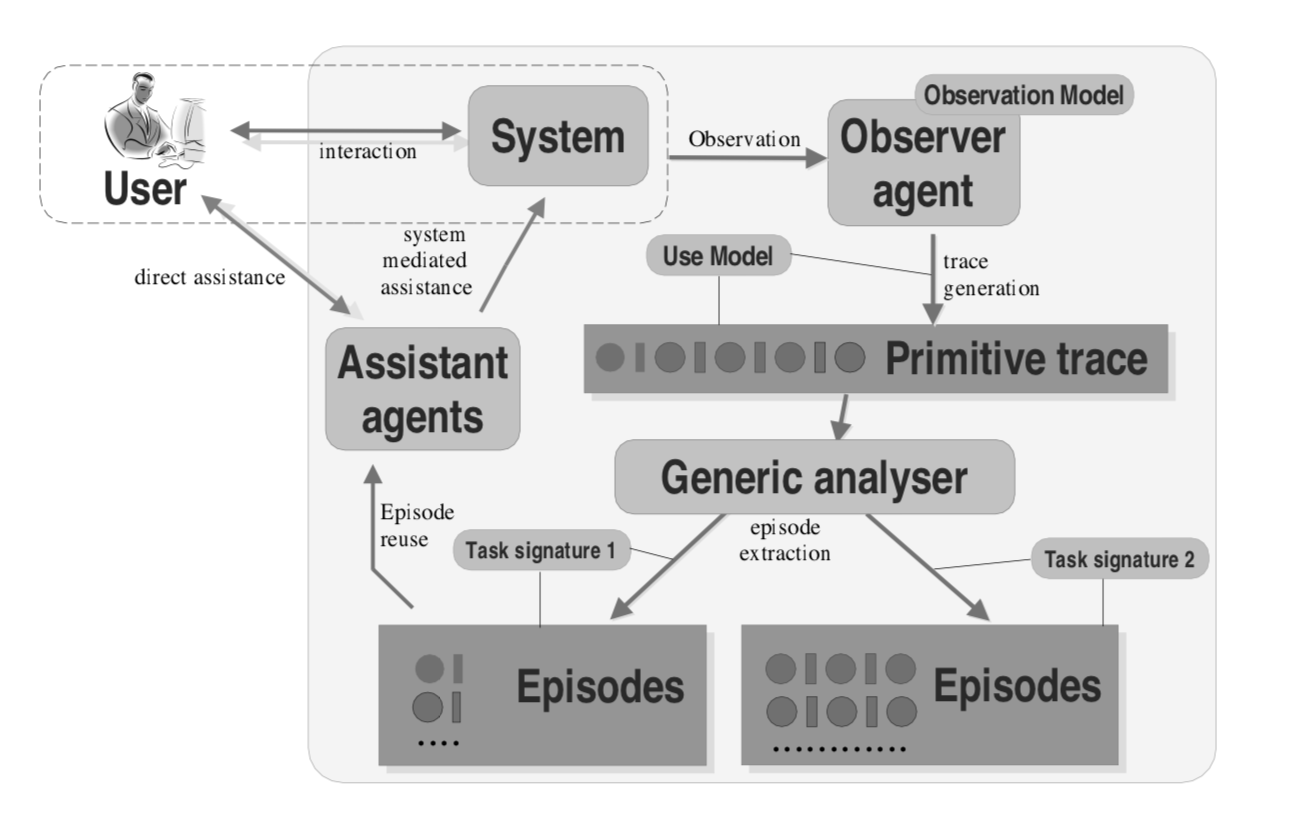
-
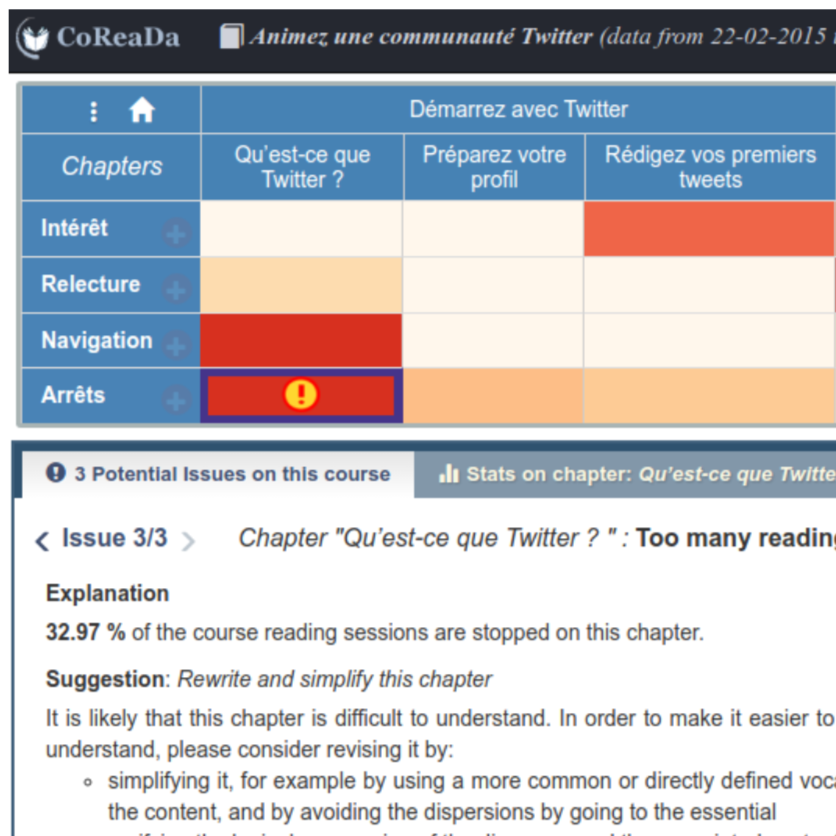
Reading Analytics
Learning Analytics
Trace-based Activity Analysis
Reading analytics are Learning Analytics focusing on learners' content consumption traces, for authors to gain insights on the way they can improve their courses. We mainly worked on the traces of OpenClassrooms Mooc courses, had some results on reading sessions detection, and built a dashboard for teachers.
Details
Partners: LS2N, LIRIS, CERIST
Funding: CERIST, Alger
Beginning: 2012-10-01
End:
Related publications
-
. () in
-
Madjid Sadallah, Benoît Encelle, Azze-Eddine Maredj, Yannick Prié. (2015) Towards Reading Session-based indicators in Educational Reading Analytics in 10th European Conference on Technology Enhanced Learning, Toledo, Spain, sept. 2015, Lecture Notes in Computer Science, vol 9307. pp. 297-310 [AR:15%] doi Show abstract It is a challenging task to identify eLearning courses parts that have to be revised to best suit learners’ requirements. Reading being one of the most salient learning activities, one way of doing so is to study how learners consume courses. We intend to support course authors (e.g. teachers) during courses revision by providing them with reading indicators. We use the concept of reading session to denote a learner’s active reading period, and we provide several associated reading indicators. In our server-side approach, reading sessions and indicators are calculated using web server logs. We evaluate the relevance of our proposals using logs from a major French eLearning platform. Results are promising: calculated reading sessions are theoretically more precise than other best applicable approaches, and course authors consider suggested indicators to be appropriate to courses revision. Using reading sessions and associated indicators could facilitate authors’ work of course reengineering.
-
Madjid Sadallah, Benoît Encelle, Azze-Eddine Maredj, Yannick Prié. (2013) A Framework for Usage-based Document Reengineering in Proceedings of the 2013 ACM symposium on Document engineering DocEng '13, pp. 99-102, 2013. doi Show abstract This ongoing work investigates usage-based document reengineering as a means to support authors in modifying their documents. Document usages (i.e. usage feedbacks) cover readers' explicit annotations and their reading traces. We first describe a conceptual framework with various levels of assistance for document reengineering: indications on reading, problem detection, reconception suggestions and automatic reconception propositions, taking our example in e-learning document management. We then present a technical framework for usage-based document reengineering and its associated models for documents, annotations and traces representation.
Related software
Additional comments
This project mainly consists in Madjid Sadallah’s PhD thesis.
Additional illustrations
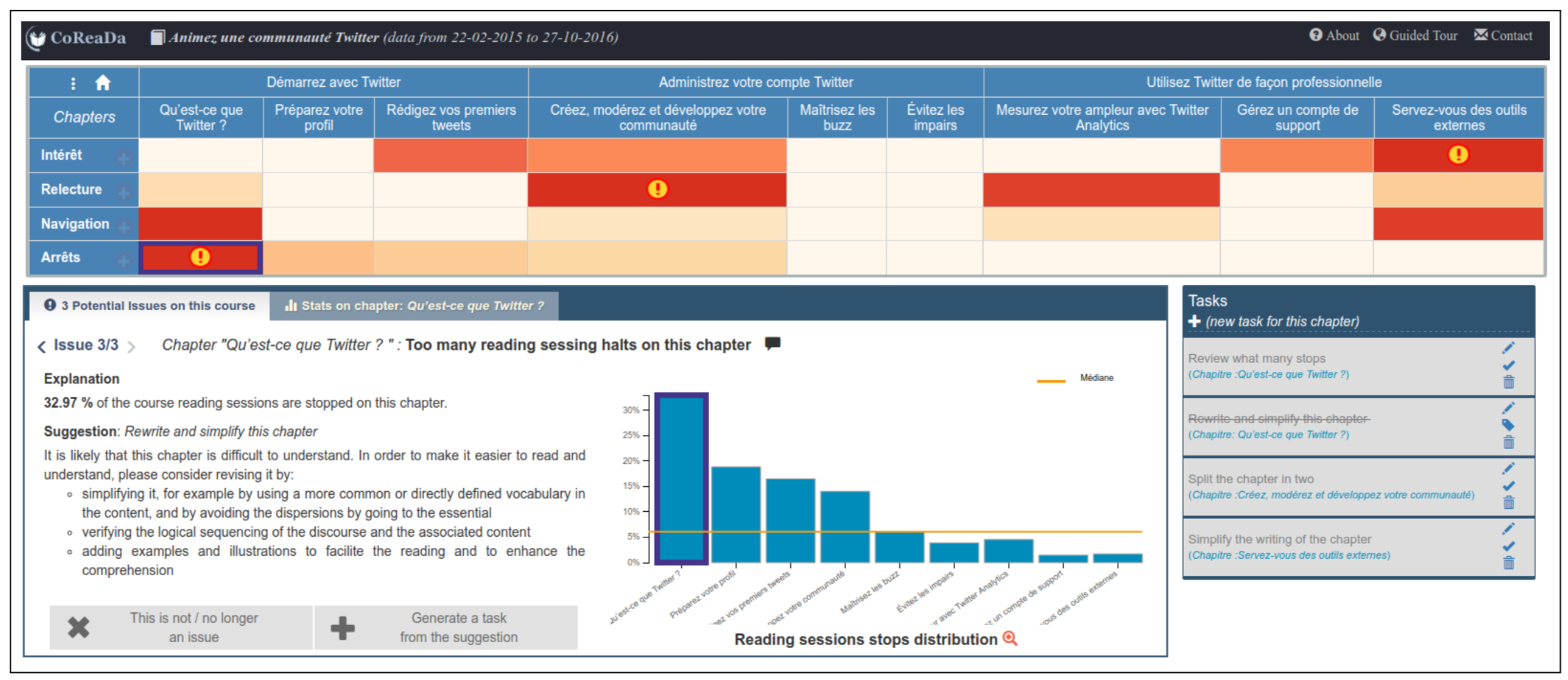
-
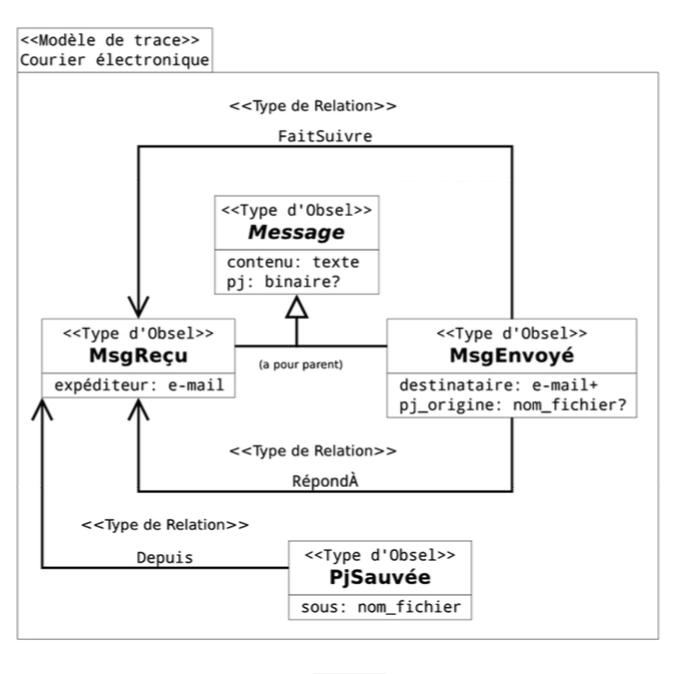
TBS: Trace-Based Systems
Knowledge Engineering
Trace-based Activity Analysis
Trace-based Systems
The main research axis of the SILEX team at LIRIS around Modelled-trace-based systems for activity analysis and user reflexivity, before it was called learning analytics. General knowledge-based modelling of Trace-bases systems, with a semantic web flavour, and lors of applications in various educational context
Details
Partners: A lot
Funding: Various projects
Beginning: 2007-01-01
End: 2013-01-01
Related publications
-
Pierre-Antoine Champin, Alain Mille, Yannick Prié. (2013) Les traces numériques comme objets de premier niveau : une approche par les traces modélisées in Intellectica, 2013-1 n°59, pp. 171-204, 2013. Show abstract Toute activité médiée par l’outil informatique laisse des traces numériques qui constituent en puissance des connaissances utiles, pour cette activité ou des activités futures. L’approche proposée dans cet article vise à exploiter effectivement ces connaissances dans des systèmes informatiques dits à base de m-traces. Cette approche consiste à proposer une modélisation a priori des traces, et à capturer leurs diverses interprétations possibles dans des transformations reproductibles. Nous proposons un méta-modèle général des systèmes à base de traces modélisées, et illustrons sa mise en œuvre dans deux applications. Nous discutons des défis que pose la conception de tels systèmes, notamment pour la prise en compte pluridisciplinaire de l’activité humaine tracée.
-
Olivier Curé, Yannick Prié, Pierre-Antoine Champin. (2012) Extending Knowledge-Based Systems to Reason Over Interaction Traces in The 18th International Conference on Knowledge Engineering and Knowledge Management EKAW 2012, Galway, oct 2012, 10p [AR:29%] Show abstract This paper presents a trace-based framework for assisting personal- ization and enrichment of end-user experience in an application. We propose a modular ontology-based architecture, to provide semantics for interaction traces, observed elements and their associated objects, and we extend existing inference services, with a declarative and generic approach, in order to reason with those interaction traces. We present the architecture of our framework and its reasoning levels, provide a proof of concept on a medical Web application, and emphasize that different kinds of actors can benefit from the supported inferences.
-
Damien Clauzel, Karim Sehaba, Yannick Prié. (2011) Enhancing synchronous collaboration by using interactive visualisation of modelled traces in Simulation Modelling Practice and Theory Journal. 19(1). pp. 84-97, 2010. doi Show abstract This article addresses issues related to traces modelling for formally describing human interactions of people engaged in a synchronous collaborative learning activity. The objective is to propose models and tools for representing, transforming, sharing and visualising traces of users’ experiences. The traces here represent the users’ activities in their interactions with the learning platform. Our proposition is based on reflexive learning defined as the ability to interact with the situation, in order to meet one’s own limitations. This work takes place in the ITHACA project which aims at developing an on-line learning platform that uses interaction traces as knowledge sources on, and for, the learners’ learning as individuals or groups. In this paper, we propose a general framework for trace management and sharing, a generic model of synchronous collaborative activity based on the notion of interaction modes that we specialized for whiteboard sharing and text chatting, and a conceptual framework for modelling the exploitation of modelled traces, in particular for interactive visualisation on the user side. This article extends our previous work [1] on the instrumented prototypes, by presenting our theorisation of the interactive visualisation of modelled traces.
-
Olivier Champalle, Karim Sehaba, Alain Mille, Yannick Prié. (2011) A framework for observation and analysis of learners’ behavior in a full-scope simulator of a nuclear power plant - Approach based on modelled traces in ICALT 2011 - The 11th IEEE International Conference on Advanced Learning Technologies</span>, Athens, Georgia, USA. July 2011. (Poster) doi Show abstract Our work deals with the subject of activity observation in full scope simulators. In this paper we present a Modelled Trace approach for designing a methodological framework and associated tools to manage the observation process and the corresponding analysis activity.
-
Olivier Champalle, Karim Sehaba, Alain Mille, Yannick Prié. (2011) Des transformations à bases de règles pour capitaliser et partager l’expertise d’observation de l’activité sur simulateur pleine échelle in IC 2011 - 22èmes Journées francophones d’Ingénierie des Connaissances</span>, Chambéry , France. 2011. (Poster) Show abstract Notre travail porte sur l’aide à l’observation et à l’analyse de l’activité dans les simulateurs pleine échelle de centrale nucléaire à l’Unité de Formation Production Ingénierie d’EDF. Les concepts clefs de notre approche sont basés sur la théorie de la trace modélisée développée par l’équipe SILEX afin de proposer un cadre méthodologique et les outils associés pour capitaliser, gérer et partager l’expertise d’observation.
-
Olivier Champalle, Karim Sehaba, Alain Mille, Yannick Prié. (2011) Observation et analyse de comportements collectifs et/ou individuels par la découverte de connaissances issues de l’exploitation d’un corpus de M-Traces d’activité sur simulateur pleine échelle in EIAH 2011 - Environnements Informatiques pour l’Apprentissage Humain, Mons - Belgique. 2011. 2p (Poster) Show abstract Nos travaux s’inscrivent dans le domaine de l’aide à l’observation de l’activité dans les EIAH de type simulateur pleine échelle de conduite de centrale nucléaire. Dans cette communication, nous présentons une démarche fondée sur la théorie de la trace modélisée dans le but de proposer un cadre méthodologique et les outils associés pour assister et gérer l'activité d'observation.
-
Tarek Djouad, Lotfi Sofiane Settouti, Yannick Prié, Christophe Reffay, Alain Mille. (2010) Un Système à Base de Traces pour la modélisation et l'élaboration d'indicateurs d'activités éducatives individuelles et collectives. Mise à l'épreuve sur Moodle in Technique et science informatique. 29(6). pp. 721-741, 2010. Show abstract Nous présentons dans ce travail un Système à Base de Trace implémenté pour le calcul des Indicateurs dans la plateforme d’apprentissage Moodle (SBT-IM). Nous présentons d’abord un cadre conceptuel permettant de penser tout système exploitant des traces modélisées en définissant les notions de trace, de modèle de trace et de transformation. Nous décrivons ensuite la mise en oeuvre de ce cadre conceptuel dans le cas d’un système à base de trace dédié au calcul des indicateurs dans les situations d’apprentissage collaboratif.
-
Julien Laflaquière, Yannick Prié. (2009) Interactive trace visualization in Trace-based systems in Workshop Interacting with temporal data at CHI 2009. Boston, MA, April 2009. 4pp. Show abstract We first introduce the notions of modeled-traces (M-traces) and trace-based systems. We then present activity analysis and activity support as the two main uses of M-traces, and we discuss interactive visualization challenges related to active reading of traces.
-
Lotfi-Sofiane Settouti, Yannick Prié, Jean-Charles Marty, Alain Mille. (2009) A Trace-Based System for Technology-Enhanced Learning Systems Personalisation in 9th IEEE International Conference on Advanced Learning Technologies, Riga, Latvia. 2009. [AR:27%] doi Show abstract This paper deals with the subject of personalization in technology-enhanced learning (TEL) Systems. As we want user centred solutions, we claim that considerable advantage can be gained from allowing observation and interpretation of learnerspsila interactions traces in TEL systems. The key concepts of our approach are modelled traces, and trace transformations. These transformations such as abstraction or filtering enable a better understanding of the interactions taking place in the TEL systems and allow to provide services for personalization.
-
Damien Cram, Béatrice Fuchs, Yannick Prié, Alain Mille. (2009) Découverte complète et interactive de motifs temporels avec contraintes numériques à partir de séquences d'événements in Atelier "Fouille de données temporelles et analyse de flux de données" à EGC2009, Strasbourg. jan 2009. 6p. Show abstract Nous proposons une méthode complète d'extraction de motifs temporels fréquents avec contraintes numériques à partir d'une séquence d'événements. Ces motifs, appelés chroniques, sont très expressifs par rapport aux motifs séquentiels plus « classiques » tels que les épisodes parallèles ou en série, ce qui implique une grande complexité dans la résolution complète. Un algorithme de résolution permettant l'introduction d'heuristiques et de contraintes utilisateur est proposé. Il est ensuite discuté comment mettre à profit les interactions avec l'utilisateur pour compenser sa grande complexité et le rendre praticable.
-
Damien Clauzel, Karim Sehaba, Yannick Prié. (2009) Modelling and visualising traces for reflexivity in synchronous collaborative systems in International Conference on Intelligent Networking and Collaborative Systems (INCoS 2009), Barcelona, Spain. pp. 16-23. 2009 doi Show abstract This article addresses issues related to traces modelling and visualization in synchronous collaborative learning. The objective is to propose models and tools for representing, transforming, sharing and visualizing traces of users' experiences. The traces here represent the users' activities in their interactions with the learning platform. Our proposition is based on reflexive learning defined as the ability to interact with the situation, in order to meet one's own limitations. This work takes place in the ITHACA project which aims at developing an online learning platform that uses interaction traces as knowledge sources on, and for, the learners' learning as individuals or groups. In this paper, we propose a general framework for trace management and sharing, a generic model of synchronous collaborative activity based on the notion of interaction modes, which we specialized for whiteboard sharing and text chatting. We modelled an IRC client and developed a first implementation.
-
Lotfi Sofiane Settouti, Yannick Prié, Damien Cram, Pierre-Antoine Champin, Alain Mille. (2009) A Trace-Based Framework for supporting Digital Object Memories in 1st International Workshop on Digital Object Memories (DOMe'09) in the 5th International Conference on Intelligent Environments (IE 09), Barcelona, Spain. IOS Press, pp.39-44. 2009. doi Show abstract In this paper, we present a Trace Based framework for managing and transforming traces of observation and use of real life objects. Considering trace based systems as Digital Object Memories (DOMe), we describe how our frame-work can be used to manage DOMe, using trace models and transformations to raise the abstraction level of traces and infer useful knowledge. To demonstrate our approach, we present a simple example of smart home where the use and the state of some of everyday objects are observed, and the resulting traces of such observations are exploited as DOMe providing useful services.
-
Julien Laflaquière, Yannick Prié, Alain Mille. (2008) Ingénierie des traces numériques d'interaction comme inscriptions de connaissances in Ingénierie des Connaissances 2008, june 2008, Grenoble, 12 pp. Show abstract Cet article s'intéresse aux traces numériques d'interaction, et en particulier à ce que nous définissons comme les traces modélisées. Contrairement à une majorité d'approches se basant sur les traces, nous considérons trace et modèle de trace explicite comme indissociables. Cet article aborde deux questions en particulier : la première, théorique, concernant le statut d'inscription de connaissances des traces modélisées ; la seconde, méthodologique, concernant une démarche de modélisation de trace que nous considérons comme une « ingénierie de la trace ». Nous y considérons l'exploitation des traces dans la dynamique d'une activité toujours susceptible d'évoluer et à laquelle le modèle de trace doit rester adapté.
-
Damien Cram, Béatrice Fuchs, Yannick Prié, Alain Mille. (2008) An approach to User-Centric Context-Aware Assistance based on Interaction Traces in Modeling and Reasoning in Context, June 2008, Delft, Netherland, 12 pp. Show abstract This paper presents an approach to context-aware assisting systems that reuse user's personal experience as an alternative to traditional systems having an explicit context model associated to reasoning capabilities on this model. This approach proposes to model the use of the environment through interaction traces representing user's experience and different processes to manage user's traces intended to be exploited for later reuse. A user's assistance is based on the reuse of past traces that are semantically similar to the current sequence of interactions representing the current context of the user. The assistance is based on the identification of recurrent task signatures, which are sequential structures representing typical tasks. These signatures are user-centric since they have been interactively elaborated in accord with the user himself. This paper mentions some possible applications in terms of experience-based user assistance and makes a comparison of this approach to the case-based reasoning paradigm (CBR).
-
Julien Laflaquière, Lotfi-Sofiane Settouti, Yannick Prié, Alain Mille. (2007) Traces et inscriptions de connaissances in Ingénierie des Connaissances 2007, Grenoble, July 2007, 2 pp. (Poster) Show abstract Trace, traces d’utilisation, environnements numériques, inscription de connaissances, modèles de trace, Systèmes à Base de Traces.
-
Julien Laflaquière, Yannick Prié, Alain Mille. (2007) Des traces modélisées, un nouvel objet pédagogique ? in Learning Object Repositories Research Network (LORNET 2007), Montréal, 2007. Show abstract La notion de trace numérique prend de plus en plus d'importance dans le domaine des EIAH. C'est notamment le cas en ce qui concerne les systèmes visant à établir une réflexivité de l'activité. Cet article propose une nouvelle approche des traces d'utilisation pour la réflexivité dans le cadre d'une plateforme d'apprentissage collaboratif en ligne, et propose de les considérer comme un nouvel objet pédagogique.
-
Julien Laflaquière, Yannick Prié. (2007) Traces d'utilisation et réflexivité : la question du collectif in Colloque ARCo'07. 8 pp. Show abstract Cet article propose de retracer le travail qui nous a amené à nous poser la question de l’exploitation des traces d’utilisation dans le cadre d’une situation de travail collectif instrumentée. Contrairement aux travaux classiques dans ce domaine, la question du collectif ne s’est pas posée directement mais indirectement. Cet article montre donc comment, à partir d’un travail sur la création de traces d’utilisation destinées à soutenir une réflexivité de l’activité quand celle-ci est médiée, nous avons été amenés à nous interroger sur ce que pourrait être la réflexivité dans un groupe de travail instrumenté, et comment un système à base de trace destiné à la réflexivité pourrait y jouer un rôle.
-
Lotfi-Sofiane Settouti, Yannick Prié, Alain Mille, Jean-Charles Marty. (2006) Systèmes à base de traces pour l'apprentissage humain in TICE 2006, oct 2006, Toulouse, 8 pp. Show abstract L’observation à base de traces dans les EIAH est au coeur des expérimentations et des études. Dans cet article nous proposons une définition de la trace d’apprentissage humain médié. Nous présentons aussi le système à base de traces, un système informatique permettant l’exploitation des traces. Pour cela, nous présentons un modèle formel et une architecture supportant ce système.
-
Julien Laflaquière, Lotfi-Sofiane Settouti, Yannick Prié, Alain Mille. (2006) A trace-based System Framework for Experience Management and Engineering in Second International Workshop on Experience Management and Engineering (EME'2006) in conjunction with KES2006. sept 2006, 8 pp. Show abstract The paper deals with experience management in computer-mediated environments. It particularly focuses on complex tasks whose support relies more on experience than on knowledge. The presented approach is based on the ?use traces? concept to investigate the ?activity reflexivity? as a first step in experience management, and experience sharing and reusing as possible applications. The paper also outlines the framework supporting Trace-Based Systems creation. Traces, trace models and trace life cycle are formally defined. The main parts of the framework architecture: collecting, transformation, visualization, and query systems are also detailed.
-
Julien Laflaquière, Pierre-Antoine Champin, Yannick Prié, Alain Mille. (2005) Approche de modélisation de l'expérience d'utilisation de systèmes complexes pour l'assistance aux tâches de veille informatiquement médiées in ISKO'France 2005 Organisation des connaissances dans les systèmes d'informations orientés utilisation : Contexte de veille et d'intelligence économique, Apr. 2005, 17 pp. </em> Show abstract L’une des évolutions les plus marquantes de ces dernières années dans les domaines de recherche en système d’information porte sur l’orientation de l’utilisation de ces systèmes. Il ne s’agit plus simplement de modéliser les informations en fonction de leurs contenus mais en fonction des utilisations qui en seront faites. Il faut donc prendre en compte à la fois les caractéristiques liées aux problèmes à résoudre par les informations ainsi que les particularités des utilisateurs de ces systèmes. Les contextes d’utilisation s’élargissent, des différents types de veille (technologique, environnemental, concurrentiel, juridique, etc.) à la veille stratégique et à l’intelligence économique.
Related software
-
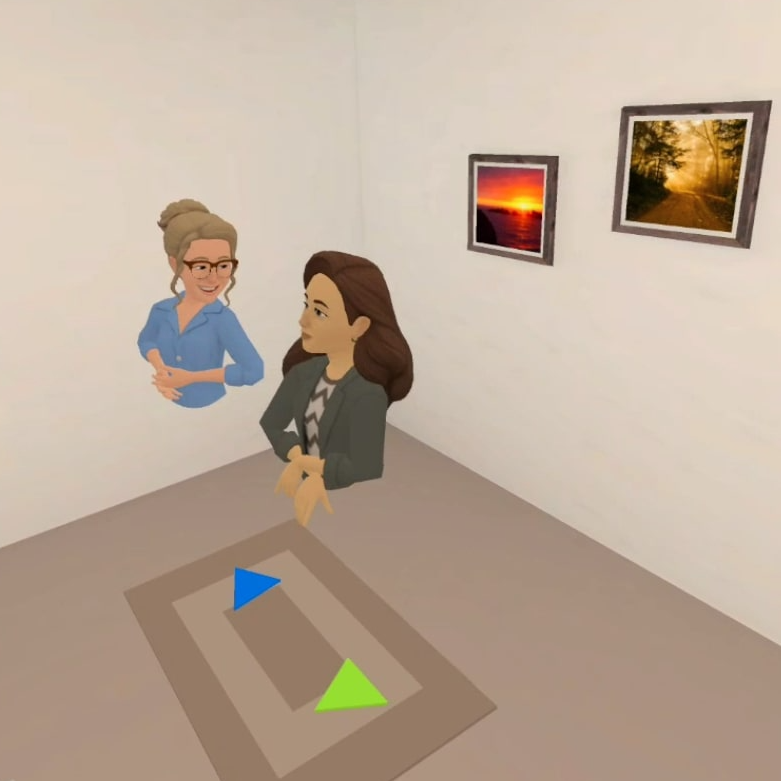
TECNIS: Immersive Teleclinic
Patient Experience
Trace-based Activity Analysis
Trace-based Systems
VR and Psychotherapy
Virtual Reality
Designing and evaluating patients' journeys in a virtual teleclinic to carry out series of neuropsychological tests with practitioners.
Details
Partners: LS2N, CHU Nantes, BioSerenity
Funding: Plan de relance.
Cofunding:
Beginning: 2022-09-01
End: 2024-08-31
Select another theme:
Accessibility
Affordances
Data Visualization
Digital Instruments
Document Engineering
Experience analysis and modelling
Hypervideos
Immersive Analytics
Interpretation Systems
Knowledge Engineering
Learning Analytics
Patient Experience
Progressive analytics
Reflective Systems
Technology-Enhanced Learning
Trace-based Activity Analysis
Trace-based Systems
VR and Psychotherapy
Video Annotations
Virtual Reality













